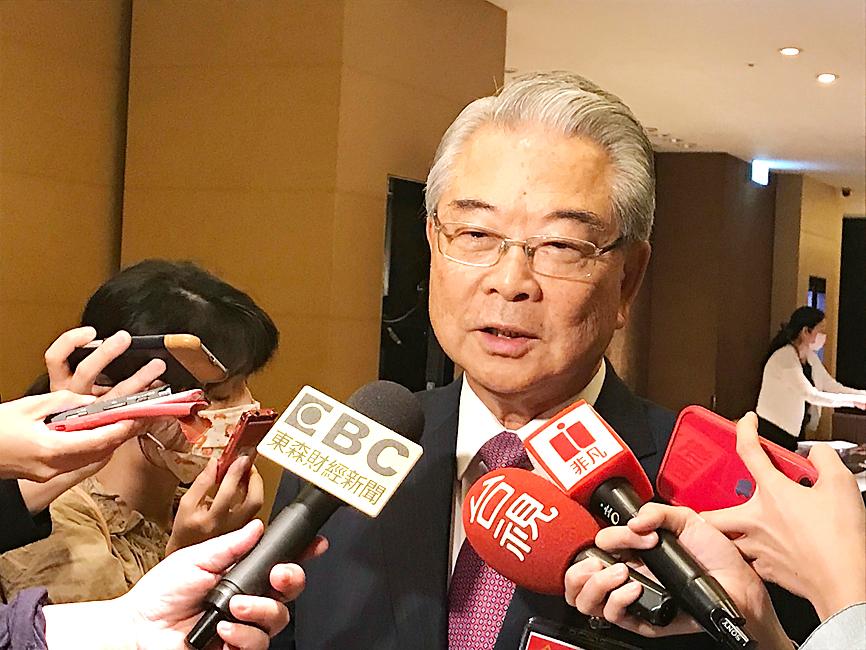Business tycoons yesterday said that component shortages might persist through next year due mainly to lingering demand-supply imbalances and chaos in the shipping industry.
“It will take a while to resolve ongoing component shortages that have slowed product delivery,” said Rock Hsu (許勝雄), chairman of the Third Wednesday Club (三三會), whose membership is limited to the top 100 firms in each business sector.
Companies would have to exercise caution in dealing with the issue, as it might extend into next year, Hsu said.

Photo: Lee Ya-wen, Taipei Times
Surging demand for semiconductors used in the 5G, Internet of Things, electric vehicle and artificial intelligence sectors is causing component shortages, while the COVID-19 pandemic is driving companies and education facilities to adopt digital transformation, he said.
However, suppliers are unable to expand their facilities to meet the increase in business, and are limited by the pandemic, said Hsu, who is also chairman of Compal Electronics Inc (仁寶電腦), the world’s No. 2 contract laptop maker.
On Tuesday, Quanta Computer Inc (廣達電腦) chairman Barry Lam (林百里) said that demand for laptops is healthy, but component shortages are so serious that he fails to see when the bottleneck would come to an end.
Acer Inc chairman and chief executive officer Jason Chen (陳俊聖) and Hon Hai Precision Industry Co (鴻海精密) chairman Young Liu (劉揚偉) have also made similar remarks.
Overbooking by clients to ensure supply security amid the pandemic might have worsened the situation, and local firms have taken precautionary measures to mitigate potential issues, Hsu said.
Lin Por-fong (林伯豐), chairman of Chinese National Association of Industry and Commerce (工商協進會) and a member of the Third Wednesday Club, said that inventory adjustments would be inevitable if clients practice overbooking, adding that container shortages and shipping delays are making things worse.
Speaking at a digital economy forum in Taipei yesterday, Pegatron Corp (和碩) chairman Tung Tzu-hsien (童子賢) described the component shortage crisis as “a sweet, but difficult burden.”
“The shortages speak to a robust demand,” Tung said.
However, Liu said at an awards ceremony on Tuesday that such shortages do not necessarily mean an increase in demand only, but could also reflect a sense of uncertainty in global supply chains.
Much as consumers hoarded toilet paper at the beginning of the COVID-19 outbreak, tech companies are hoarding components and materials, he said.
“The US-China trade dispute, the Huawei Technologies Inc (華為) ban, the COVID-19 pandemic and the emergence of 5G ... all added to uncertainty,” Liu said. “We are now seeing industries that were not used to do advance ordering — such as the automotive industry — stocking up much more.”
Liu said that component shortages could affect about 10 percent of Hon Hai’s orders, but he added that rush orders could disproportionally affect the company’s business.
“When we get lots of rush orders and overbooking, it does cause a more serious effect. It is hard to tell how long the delays will be,” he said.

CHIP RACE: Three years of overbroad export controls drove foreign competitors to pursue their own AI chips, and ‘cost US taxpayers billions of dollars,’ Nvidia said China has figured out the US strategy for allowing it to buy Nvidia Corp’s H200s and is rejecting the artificial intelligence (AI) chip in favor of domestically developed semiconductors, White House AI adviser David Sacks said, citing news reports. US President Donald Trump on Monday said that he would allow shipments of Nvidia’s H200 chips to China, part of an administration effort backed by Sacks to challenge Chinese tech champions such as Huawei Technologies Co (華為) by bringing US competition to their home market. On Friday, Sacks signaled that he was uncertain about whether that approach would work. “They’re rejecting our chips,” Sacks

Taiwan’s exports soared 56 percent year-on-year to an all-time high of US$64.05 billion last month, propelled by surging global demand for artificial intelligence (AI), high-performance computing and cloud service infrastructure, the Ministry of Finance said yesterday. Department of Statistics Director-General Beatrice Tsai (蔡美娜) called the figure an unexpected upside surprise, citing a wave of technology orders from overseas customers alongside the usual year-end shopping season for technology products. Growth is likely to remain strong this month, she said, projecting a 40 percent to 45 percent expansion on an annual basis. The outperformance could prompt the Directorate-General of Budget, Accounting and

NATIONAL SECURITY: Intel’s testing of ACM tools despite US government control ‘highlights egregious gaps in US technology protection policies,’ a former official said Chipmaker Intel Corp has tested chipmaking tools this year from a toolmaker with deep roots in China and two overseas units that were targeted by US sanctions, according to two sources with direct knowledge of the matter. Intel, which fended off calls for its CEO’s resignation from US President Donald Trump in August over his alleged ties to China, got the tools from ACM Research Inc, a Fremont, California-based producer of chipmaking equipment. Two of ACM’s units, based in Shanghai and South Korea, were among a number of firms barred last year from receiving US technology over claims they have

BARRIERS: Gudeng’s chairman said it was unlikely that the US could replicate Taiwan’s science parks in Arizona, given its strict immigration policies and cultural differences Gudeng Precision Industrial Co (家登), which supplies wafer pods to the world’s major semiconductor firms, yesterday said it is in no rush to set up production in the US due to high costs. The company supplies its customers through a warehouse in Arizona jointly operated by TSS Holdings Ltd (德鑫控股), a joint holding of Gudeng and 17 Taiwanese firms in the semiconductor supply chain, including specialty plastic compounds producer Nytex Composites Co (耐特) and automated material handling system supplier Symtek Automation Asia Co (迅得). While the company has long been exploring the feasibility of setting up production in the US to address